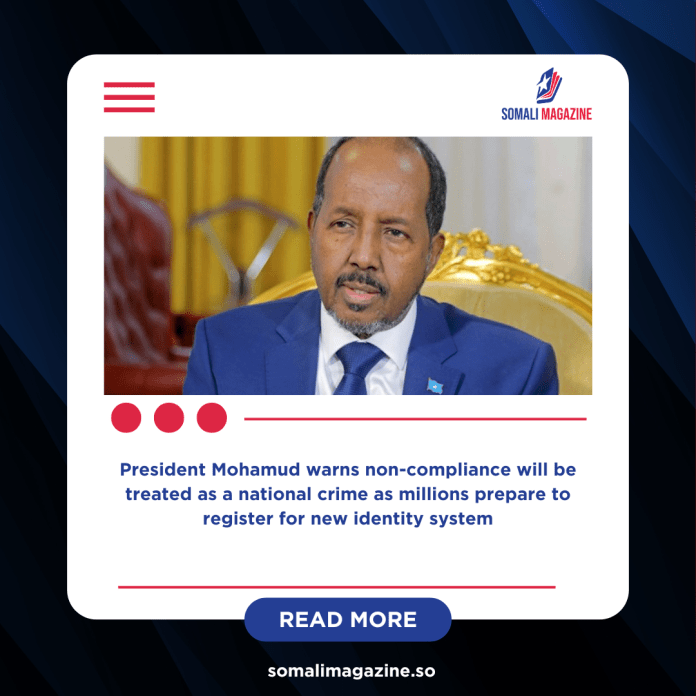Facebook Twitter (X) Instagram Somali Magazine - People's Magazine
Somali President Hassan Sheikh Mohamud has announced major changes to the way passports and identity cards will be handled in the country, warning that anyone who refuses to comply with the new system will be considered a criminal against the nation.
Speaking in Mogadishu on Wednesday, the president said that the current passport system is no longer reliable and is open to abuse. According to him, more than 10 million people currently hold Somali passports, but the government cannot confirm how many of them were issued properly. To address this problem, he ordered that the new national identity card must now take the place of the passport in almost every area of public and private life.
The president made it clear that institutions and individuals who ignore or resist this directive will face severe consequences. He warned that allowing people to bypass the national identity card system enables terrorism, theft, and the illegal presence of foreigners in the country. “Anyone who facilitates the non-implementation of the national identity card should know that he is a national criminal. He has facilitated terrorism, he has facilitated thieves, he has facilitated the presence of illegal foreigners in the country,” President Mohamud declared.
He also explained that Somalis who do not register for the new identity card will eventually lose their basic citizenship rights. All government services, including access to education, health care, and employment opportunities, will soon be tied to the national identity database. By making this card the only official proof of identity, the government hopes to tighten security and ensure better delivery of services across Somalia.
Since the biometric ID system was introduced, about half a million people have already registered and received their cards. But the government estimates that around 20 million Somalis will need to get one before the system can be considered fully operational. Authorities believe the card will play a vital role in curbing fraud, protecting national resources, and reducing the misuse of documents.
The National Identification and Registration Authority (NIRA), which is responsible for rolling out the new system, has already set important deadlines. Starting September 1, 2025, no one will be able to apply for or renew a Somali passport without first presenting a national identity card. By January 1, 2026, the ID card will also be required for domestic air travel. These measures are expected to gradually push every Somali citizen to register and obtain their biometric card.
The government is presenting the new card as a key tool for strengthening Somalia’s security and rebuilding trust in public institutions. It is also seen as part of broader efforts to modernize the country’s systems and align them with global standards. For many ordinary Somalis, it could mean easier access to banking, healthcare, and educational services, while also protecting them from identity theft or exploitation by criminal networks.
However, the rollout has not been without challenges. Some regional authorities, including Puntland and Jubbaland, remain opposed to the scheme. Their leaders have raised concerns about how the program is being implemented and whether it respects regional autonomy. This political resistance has slowed down progress, and it remains unclear how the government will resolve the disputes while still pushing ahead with its ambitious timelines.
Despite these hurdles, President Mohamud has signaled that his government is determined to make the system work. He insists that the future of Somalia’s stability and development depends on having a secure, unified national identity system that leaves no room for abuse. With deadlines approaching and millions still unregistered, the coming months will be crucial in determining whether the biometric ID becomes a success or deepens political tensions.

